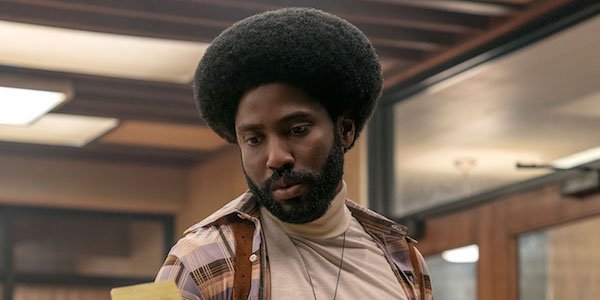While superhero movies and large franchises are fun moviegoing experiences, they don't necessarily reflect the world we live in. That's a task for smaller projects and directors with a real perspective on the world. And throughout the past few decades, there are few filmmakers who capture the current zeitgeist more than Spike Lee. Lee has made challenging and critically acclaimed dramas since 1986's She's Gotta Have It (which the director recently adapted into a successful Netflix series). His new project is BlacKkKlansman, and tells the out-of-this-world true story of Detective Ron Stallworth, a 1970s police officer who infiltrated a local, and obviously dangerous, chapter of the Ku Klux Klan. The story is truly wild, and Lee is just the visionary to pull it off.
After making history as a black police officer in 1970s Colorado, Ron Stallworth (Ballers' John David Washington) sees an ad for the local chapter of the KKK, and makes a cold call. While he's able to quickly get invited to potentially join the group and even have phone calls with Grand Wizard David Duke (Topher Grace), there's one problem: he obviously can't show up to a meeting looking like himself. That, and he accidentally used his real name on the phone. Enter Adam Driver's Detective Flip Zimmerman, who needs to play "Ron" in order to go deeper into the KKK and its members.
It's a premise that sounds almost cartoonish, yet it's a true story. Spike Lee leans into this dissonance throughout the course of BlacKkKlansman, which borders on both a comedy and visceral political drama at different points throughout the 135-minute runtime. Lee has always made hyper-stylized films, and BlacKkKlansman is no exception. While the issues of race, intersectionality, and extremism are at the film's heart, it ultimately bounces along thanks to the myriad moments of levity. And while the film is an emotional and sometimes harrowing journey, it never feels overly dark or intense.
BlacKkKlansman's unique tone is the most obvious in the way Spike Lee handles the film's villains. Topher Grace's David Duke is the most insidious of the film's antagonists, yet he functions in dual roles. In addition to being the bad guy, in many ways he's also the butt of the film's jokes. Ron Stallworth's ability to get one over on the KKK figurehead is the cause for plenty of comedic beats, as the film's protagonist makes the real-life figure out to be the fool multiple times throughout the movie. Grace plays the performance to slimy perfection, despite the dark place it takes him as an actor-- especially in the film's third act.
Fans of Spike Lee's prolific film career will be happy that so much of his signature style is infused in BlacKkKlansman, although the film is arguably bigger in scope than the majority of his projects. Like any good Spike Lee joint, the music once again takes center stage, and helps to motivate the movie's action and setting. But rather than a long and varied collection of songs, the soundtrack to BlacKkKlansman is a bit more selective, and only a few tracks make it into the finished product. Lee actually found an unused Prince track for the film's credits, a cover of the spiritual "Mary Don't You Weep."
Speaking of credits, Spike Lee goes for a major gut punch in the film's closing moments. After the main story of BlacKkKlansman wraps up, there's a coda that brings the film's contents directly into the modern political climate. Before the credits roll, Lee includes footage of the Charlottesville protest, including the attack that killed protestor Heather Heyer. BlacKkKlansman is dedicated to her memory, which occurred only after receiving permission from Heyer's mother. Its a sequence that is very hard to get through, and ends the film in a powerful way that no one could have expected.
As is the case with all Spike Lee films, the film's contents are inherently political. And while his creative choices may alienate audiences who have opposing viewpoints, Spike Lee's movies have always been focused on the black experience in America, and on the inequality and hatred that exists in the world. And if you can allow Lee to take you on the journey, BlacKkKlansman is undoubtedly one of the most powerful films of the year.
Your Daily Blend of Entertainment News

Corey was born and raised in New Jersey. Graduated with degrees theater and literature from Ramapo College of New Jersey. After working in administrative theater for a year in New York, he started as the Weekend Editor at CinemaBlend. He's since been able to work himself up to reviews, phoners, and press junkets-- and is now able to appear on camera with some of his favorite actors... just not as he would have predicted as a kid. He's particularly proud of covering horror franchises like Scream and Halloween, as well as movie musicals like West Side Story. Favorite interviews include Steven Spielberg, Spike Lee, Jamie Lee Curtis, and more.

